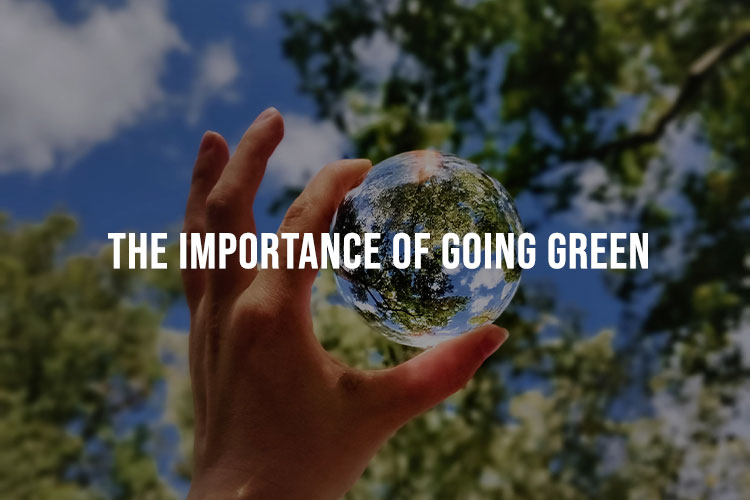The days when people’s purchasing decisions were based primarily on the price and quality of the product seem to be behind us. Nowadays, consumers are considerably more educated, and, therefore, demanding. They are conscious of the effects their buying decisions have on society and the environment, and have shown a significant preference for environment-friendly brands and businesses. Further, customers that prefer to buy products and services from brands that adopt environment-friendly practices often have similar buying attributes and characteristics.
Consumers who understand how their actions impact the environment are more likely to transact with brands that have developed green practices. As we become more conscious of our influence on the environment and are subject to changing government regulations and media trends, our decisions begin to reflect our desire to help conserve the planet.
Brands that follow eco-friendly techniques such as sustainable procurement of materials, recycling, waste reduction programmes, and energy efficiency measures are growing in their appeal to consumers who are aware of changes in regulations and policies associated with the environment.
Accordingly, brands are becoming more environmentally conscious, and are actively working to reduce their carbon footprint, like:

Building your business success with our strategies and solutions.
Increase your Sales: Lets boost your sales with irrestible marketing tactics
Control your expenses: Take charge of your expenses and optimize your performance.
Build your team: Partner with us to build a high-performing team for your business
Puma
Puma updated their sneaker packaging in 2011 and called it “The Clever Little Bag.” This reusable shoe bag is composed of cornstarch and spontaneously decomposes in three months. So far, the bag has decreased the company’s paper use by more than 65 per cent, and yearly carbon emissions by 10,000 tonnes!
P&G (Procter & Gamble)
The company has a significant influence on society. As a result of which, their environment-friendly activities have the potential to make a significant impact. Procter & Gamble’s environmental sustainability activities are largely focused on water use, trash, CO2 emissions, and sustainable packaging.
These initiatives have already delivered spectacular results. They collect water from HVAC systems in their Saudi Arabia location and reuse it for irrigation. 70% of their worldwide manufacturing facilities deliver no industrial trash to landfills. Many of their items are manufactured entirely with wind energy. Most importantly, their “Holy Grail” project aims to make 90% of the company’s packaging recyclable.
Apple
Apple is on a mission to make products that are the best in the world, and the best for the world. The company has accomplished this by using 100% renewable energy to power its facilities, utilising eco-friendly materials in its products, and developing Daisy, a recycling robot!
Apple announced a $1 billion contract with First Solar in 2015 to power its California retail stores, headquarters and data centres. The company has allowed consumers to trade their gadgets and devices for a gift card, or have them recycled for free, through the Apple Renew Program. Additionally, Apple has eliminated PVC from all of its power cables and headphones, making them safer to recycle.
Nike
Nike’s aim is to reduce its environmental footprint one step at a time. Their new products, with their unique symbol, are made of recycled materials and have a minimal effect on the environment. The company is converting factory straps to premium materials and considerably reducing their water consumption in the manufacturing process.
They’ve employed programmers to create an app that allows people to compare the environmental impact of various materials. Furthermore, they have begun to use post-consumer recycled materials in their goods, including the 2011 ICC World Cup jerseys.
Customers are actively looking for brands that are eco friendly in some way.
An independent study conducted by SmartestEnergy reveals that 81% of people prefer to buy from environment-friendly sellers. The Greenprint Sustainability Index has shown that :
- 75% of millennials are likely to pay more for an environment-friendly product.
- 77% of Americans are concerned about how the products they buy will impact the environment.
- 87% of consumers want brands to work now to facilitate future sustainability.
Customers that care about the environment are worried about protecting themselves and their families from the threats of pollution, damaging carbon emissions, and items containing harmful chemicals. Consuming products that are sustainably sourced, organic, and non-harmful to the environment allows for cleaner, healthier, and toxin-free living environments. Consumers are gradually preferring brands whose products have eco-friendly features and demonstrate their usefulness, even if the products are different from other, more traditionally manufactured ones.

Greenwashing and how big companies have been pulled up for it
Businesses and brands need to change with time. They need to be able to adjust their public image to avoid the risk of being isolated by customers. If the public feels that a brand or company is outdated and doing more harm than good, there’s a high probability that they will stop considering this brand as a seller for the products/services they desire. Over time, as people have become more environmentally conscious, brands have been forced to display themselves as progressives who care about their social responsibilities, rather than just raking in the profits.
‘Greenwashing’. The term can be defined as an act done by brands or businesses, in an endeavour to mislead people/customers who are environmentally conscious, and care about the footprint that the products and services they purchase leave on the environment. One major greenwashing case that grabbed the public’s attention was when the world’s biggest furniture retailer IKEA, was found linked to illegal logging in the protected Siberian forests of Ukraine.
Fashion brand companies such as H&M, Zara, and Uniqlo have also been pulled up for greenwashing through the years. These fashion firms add to the vast volumes of textile waste generated by the garment industry. According to the non-profit fashion platform ReMake, 80% of leftover textiles are burned or disposed of in landfills, with just 20 % reused or recycled.
Greenwashing is most definitely unhealthy for a company’s reputation. It’s possible that greenwashing may not be deliberate every time, but once a perception is formed, it’s hard to reverse. In almost all circumstances, corporate greenwashing has damaged the company’s reputation, and this can often lead to a decline in sales.
Why will it be important for your company to take a stand on the environment?
If you are operating a business, it’s time you stopped operating only for profit. It is crucial that your business operates in a way that is socially responsible and mindful of the environment that we all share. Although legally enforceable regulations are still being developed, it is still considered good practice to consider social and environmental problems.
Your success could soon depend on your social responsibility and ethical behaviour. According to the 2015 Cone Communications/Ebiquity Global CSR research, 91% of global consumers want corporations to act responsibly to solve social and environmental challenges. Furthermore, 84% said they look for environmentally friendly items whenever accessible.
These figures show that people are becoming more and more conscious about their social responsibilities, prefer products from a brand that understands CSR (Corporate Social Responsibility), and cause little to no harm to the environment in the course of their operations.
Why should you start thinking of this?
Being environment-friendly and adopting sustainability improves the public image of your brand or business. It encourages those customers who will evaluate your brand’s environmental footprint while deciding whether to buy your product or not, and this segment of customers is due to increase exponentially. If your business is committed to green practices, it will also create news that spreads, and generate good PR for your business and brand. So, going green can also be a tool for brand awareness and brand building.
If you’re utilising environmentally friendly systems, you should shout about it from the rooftops. Share it on your social media accounts and make a narrative out of it. You should also present your efforts to local media forums in the hope that they will cover it as well. Customers will take notice and interact with your brand and products/services as a result. However, be careful not to get caught with your hand in the greenwashing jar. The results will be unsustainable, to say the least.



